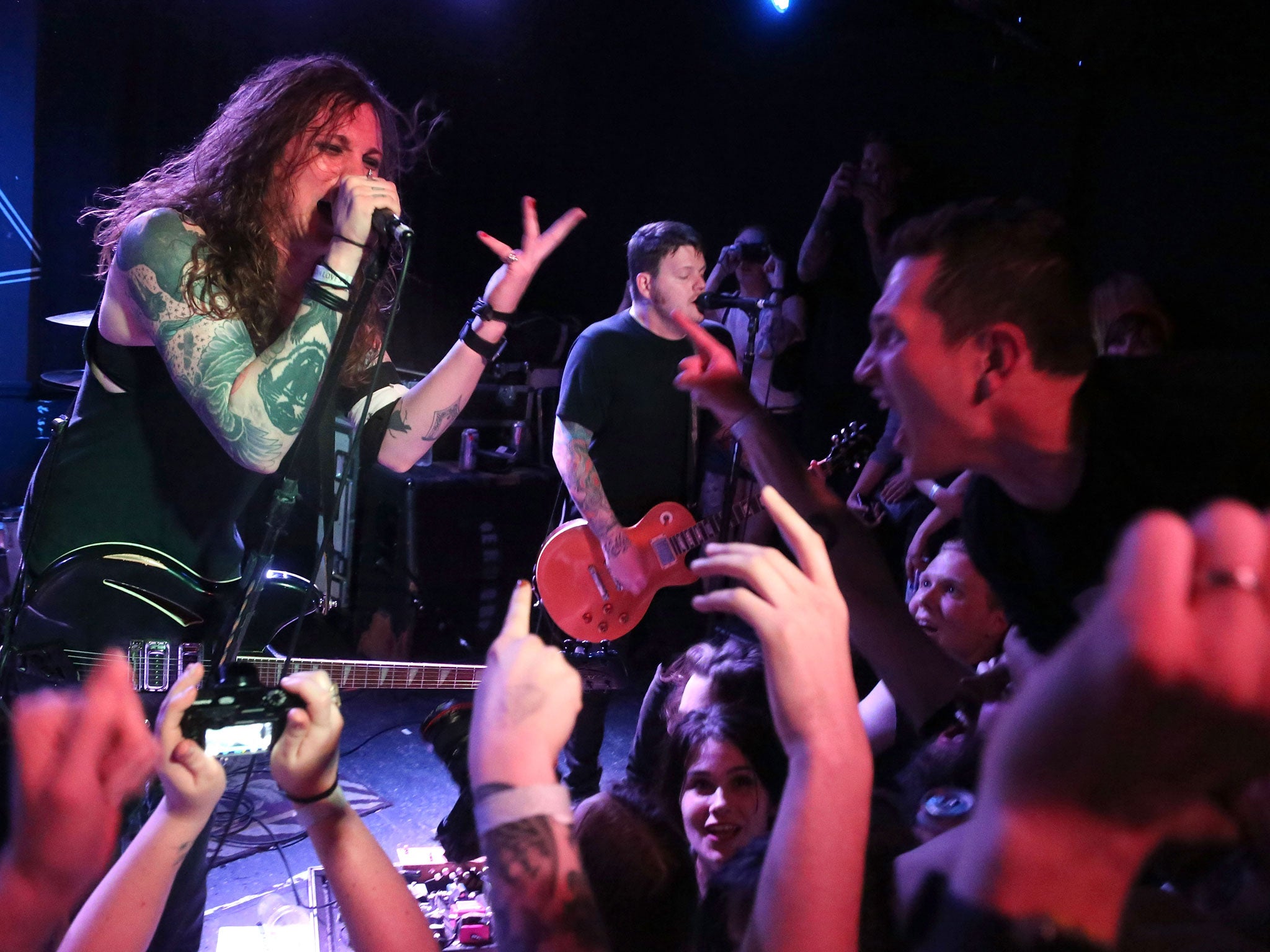Nervus – Permanent Rainbow: Exclusive Album Stream
Watford-based indie-punk rock band stream their debut album exploring themes of addiction and gender dysphoria, exclusively with The Independent

Nervus started life as a bedroom project for guitarist / vocalist Em Foster, who began writing songs as a way to work out struggles with addiction. But looking back on it today, it’s obvious to Em that those addictions were being used as a means to mask a problem that ran so much deeper. ‘I had an acoustic singer / songwriter project’ says Em, ‘but I was becoming increasingly aware of how uncomfortable I was presenting myself as male. I decided that if I presented myself as part of a band, I'd feel more comfortable. It was a way for me to challenge myself to write songs in ways that I hadn't done before and lyrically work through some s**t basically. It wasn't ever really intended to be something that would be played live, it was just me writing songs for my own mental health!’
Much of the material on Permanent Rainbow (available to stream exclusively with The Independent above) explores Em wrestling with gender dysphoria and the societal pressures to identify as the sex one is assigned with at birth. Em is a non-binary trans woman who has felt shoe-horned by Western society’s regressively narrow outlook on gender identification. ‘We get forced down the tube of identity according to our genitals’ she says ‘and I’d never felt comfortable identifying as a man. I couldn't understand why I felt like I didn't fit into this box that I'd been put into, it just felt like something that I had to shut up about and get on with really. There were things that I would fixate on, like wearing make-up, which was something that I wanted to do but I didn’t understand why so I would punish myself as a result. Society doesn't really allow you any room to explore gender identification. It’s like being told to get dressed in a shoebox; you don't have the space because society won’t allow you the space to actually work yourself out in that way. Some people have the confidence to work things out within those confines and that’s great, but I never did, so I had to work out a lot of those things in private. I’d find myself trying to beat any feminine feelings or tendencies to death because that’s what society trains you to do. I couldn't deal with the idea of being someone's 'boyfriend', my romantic life suffered, I never wanted to take a shower and have to deal with my body. I just constantly felt like I was living the wrong life.’
The catalyst for Em discovering that these feelings shouldn’t be merely dismissed came with the release of Floridian punk band Against Me’s sixth studio album, Transgender Dysphoria Blues. Led by the candid and forthright Laura Jane Grace, who came out as transgender in May 2012, it proved to be a transformative moment in Em’s life. ‘It got to a point where I really couldn't hide it from myself anymore, which is what I had been doing essentially. Transgender Dysphoria Blues came out, and I've always been a fan of Against Me and that album made things hit home in a way that they hadn't previously. I hadn’t ever heard a trans story from a trans perspective before and at that point realised that it wasn’t something that I could just brush off. There was quite a prolonged battle between becoming aware of it and coming out to the people around me; that was probably where things got the most hectic for me with regards to my mental health, just because it was getting to a point where I couldn't hide it anymore and I didn't know how to even begin to approach unpicking that in my mind.’

Transgender role models are vital in helping people come out; Laura Jane Grace gave Em the strength to realise that she shouldn’t quell her own gender identity. But the perception of transgender people within the media is just as important and this is an area that Em feels there is still much work to be done in order to battle antiquated views. ‘I think it's great that there are more transgender people in the public eye,’ says Em ‘but I think that you do need a level of visibility in the media where we aren’t just the butt of a joke. I remember seeing things like Ace Ventura and there’s that scene where the antagonist is revealed as being transgender. The reaction to that is a whole load of characters being sick; seeing that perception of trans people when you’re growing up reinforces this idea that ‘trans = bad’. If you don't have people in the media being open and proud and saying 'Hey, I'm trans and that's ok!', then it continues to reinforce that stereotype.’
Two days before our conversation, David Cameron was awarded ‘ally of the year’ by online LGBTQ newspaper Pink News for introducing same-sex marriage in England and Wales, a decision that has proved to be controversial as Em explains. ‘The conservative government's policies on immigrant and LGBTQ refugees and asylum seekers is if you would like to seek asylum into the country because of your sexuality, you have to prove that you’re gay. That's judged by a panel of people, who may come to the conclusion that a refugee is pretending to be gay and refuse them entry. David Cameron oversaw a government that made decisions like that and he's now been made ally of the year by Pink News who are supposedly an LGBTQ news organisation and I think that's a load of bulls**t! It's damaging and doesn’t represent 90% of the views held by people in the LGBTQ umbrella. That's the sort of attitude I see within the mainstream media that I think needs to change; sure we have some trans people with a voice but there's a whole load of people still being hateful, bigoted and stupid, so there's still a long way to go I think. I still don't feel safe.’
Sometimes, even voices from the trans and LGBTQ communities can have oppressive views on gender dysphoria. ‘There's people like Richard O'Brien for instance, who identifies as transgender, but will then say massively damaging things about transgender people. I can only assume it's some form of self-loathing, because he says that transgender women will never be real women, and it just makes you think, ‘well why do you think that?’ I think there's still more mainstream bigotry about trans people than there is about anything else at the moment with people like Barry Humphries, Germaine Greer, Richard O'Brien, and the hordes of people who leap to the defence of transphobic people by saying 'It's free speech, they can say whatever they want!'. So, while it is more in the public eye, I think there's still more public defenders of hatred than ambassadors of transgender acceptance. I think that people are people and anybody calling out anyone else about gender identity is just bulls**t!’
Not only did Em have a mounting confusion over gender identity, but she also struggled with an addiction to alcohol, which she used as a means to escape reality; it was easy to hide away in a world of booze when it’s such a fundamental part of our culture, particularly in the UK. ‘It got to a point where I was so dependent, I couldn't go more than two days without having a drink; I’d get to day three and start feeling really down, I’d want to cry all the time and that’s around about the time I would turn to drink. The difficult thing about addiction is it often comes across as quite romantic in the press but it's f**king not! It's the worst thing, you ruin relationships with your family, you ruin relationships with your friends and it doesn’t take long before you find you've got very little left. I didn't get as low as many people do and I'm thankful for that but I did get to a point where I thought 'I'm not going to have anywhere to live soon and I need to deal with this! People often won’t notice if someone’s struggling with alcohol addiction because it's so engrained in our culture to drink. There's always someone you can go out for a pint with, which then turns into three pints and then you stop by the off license and have four cans at home; that sort of drinking culture is rife within our society.’
Em spent much of 2014 crafting the songs that make up Permanent Rainbow, initially simple as a means to work through these issues. But once close friends around her heard the demos, they insisted that this was a set of songs that shouldn’t stay confined to her bedroom. ‘Paul (Etienne, keyboards) and Karl (Woods, bass), both of whom I’ve known for years, approached me and asked what I was doing with these songs. When I told them I didn’t have any plans for them, they said that they’d like to be involved in some way and it seemed like a no-brainer to have two of my best friends involved in this band. I play with Jack (Kenny) in another band and he seemed to fit in with the line-up. It was never originally intended to be a band, but once I’d got that encouragement from other people, it gave me the impetus to finish writing a whole album.’
We clearly have a lot to thank Paul and Karl for; it would have been a huge loss for emotionally-driven, infectious, indie punk rock if these songs had never seen the light of day. The duality of combining soul-searching, intimate lyrics with cheerful, uplifting melodies makes for an immediately satisfying record that continues to reveal hidden depths and meanings over time. A song like Bones may seem on the surface to be a relatively upbeat 3 minute ditty, but peel away the layers with lyrics such as you’ve got that natural glow / it makes me sick to my stomach and I don’t belong here / I have to get out / good riddance said the voice in my head/ good riddance she said reveal a dark level of inner turmoil. ‘I wanted to write about these things’ says Em, ‘but I felt like I was being a lot more direct than it turns out I was. When I wrote Bones, I figured that everyone was going to know that it was about gender dysphoria, but reading the lyrics back I realise that I was being a little more opaque than I had thought, especially given that it is so dressed up in metaphor. I think it’s important to write personal lyrics that other people can relate to regardless of their experience. That’s what draws me to the bands I love; they sound honest and authentic without demanding the listener experience the same things the author has. Creating this album took me from a very dark place to an incomparably positive one, and I hope that it can do the same for other people.’
Permanent Rainbow is released via Venn Records and The LP Café on vinyl and digital on Friday 4th November. Nervus play three UK shows in November.
Join our commenting forum
Join thought-provoking conversations, follow other Independent readers and see their replies
Comments
Bookmark popover
Removed from bookmarks